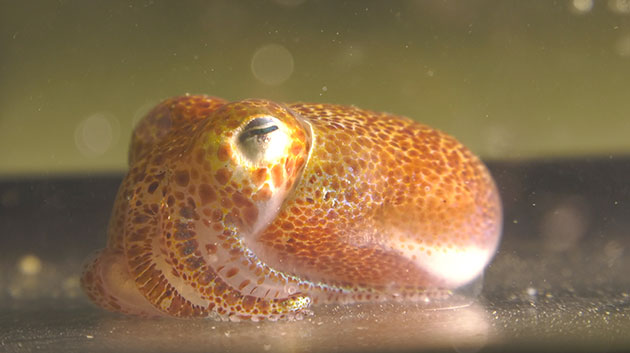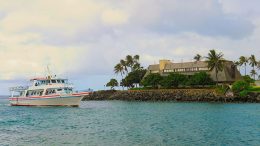
The humble Hawaiian bobtail squid is helping to build the University of Hawaiʻi’s capacity in the hot field of microbiome research. A microbiome is a community of microorganisms. Researchers at UH Mānoa’s Kewalo Marine Laboratory are studying the simple squid and its interactions with a single bioluminescent bacterium (vibrio fisheri) that grows inside of it to shed light on the incredibly more complex human microbiome.
“We use the squid-vibrio system as a very simple model and the bacteria, this particular luminous bacterium that makes light for the squid associates with the animal cells in exactly the same way as our bacteria associate with our cells,” explains Margaret McFall-Ngai, director of the UH Mānoa’s Pacific Biosciences Research Center.

Pacific Biosciences Research Center Researcher Ned Ruby adds, “And we hope that by understanding how it works in a simple model system like ours or like several others that are being studied out there, we’ll be able to understand how to maintain health of humans and how they maintain their beneficial associations.”
Microbiome research is so important that the White House announced a National Microbiome Initiative in 2016 to understand, protect and restore healthy microbiome function, with specific implications for human health, environmental sustainability and energy and food production.
- Related UH News story: UH Mānoa partners in National Microbiome Initiative, May 26, 2016
“Not only is the diversity of the biosphere principally microbial, but the health of every single corner of the biosphere relies on the interactions that corner of the biosphere has with the microbial world,” says McFall-Ngai. “It’s huge and deep.”
With more than a dozen researchers, led by three members of the National Academy of Sciences, including McFall-Ngai, UH is a veritable microbiome powerhouse. McFall-Ngai says with the isolation and landscape of the Hawaiian Islands, the university is also uniquely positioned to study the interactions between environmental microbial communities and the human microbiome, and refers to it as “total virgin frontier.”
As she sees it, with expertise across multiple disciplines, the University of Hawaiʻi is poised at the vanguard of environmental microbiome research.
—By Kelli Trifonovitch

